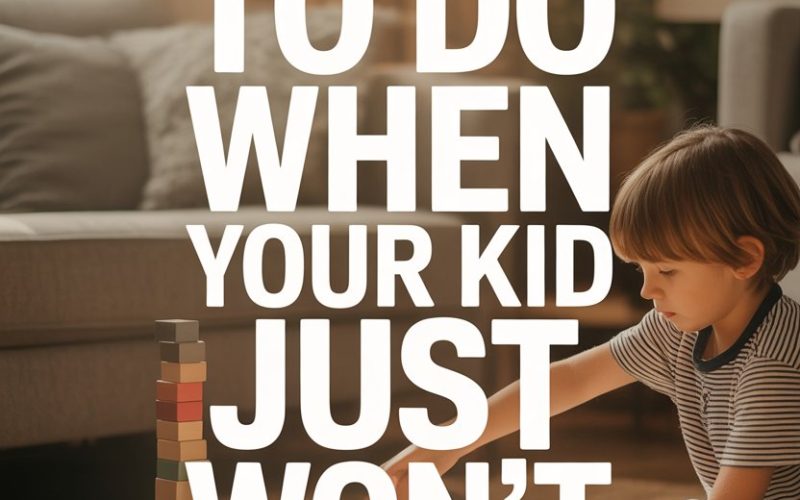Ever tried to get a goldfish to recite Shakespeare?
That’s what it can feel like when your child, bless them, just cannot focus—on maths, reading, tying shoes, or even something as riveting as “helping” you with the groceries.
You may find yourself questioning your own attention span, or if maybe, just maybe, they swapped your real child for a particularly determined squirrel.
Before you start Googling “boarding schools with military discipline,” take a deep breath. You’re not alone, you’re not a bad parent, and your child isn’t broken.
Focus is a learned skill—one that requires a bit of patience, creativity, and, occasionally, bribery (the good kind).
Here’s how to help your easily-distracted darling find their groove, even when you’ve barely found your coffee.
Spotting the Difference Between Typical Wiggles and Something More
Every child zones out now and then. Daydreaming about dinosaur space pirates is, apparently, essential to the under-10 experience
. The trick is recognising when occasional distraction is just that, or when there may be an underlying issue.
Teachers often notice focus struggles early on.
If your child’s teacher has said, “They’re a lovely kid, but they do have a rich inner life,” (translation: your child is busy counting ceiling tiles while everyone else is learning fractions), it might be time to watch a bit closer.
Developmental paediatricians and educational psychologists recommend looking for patterns across different settings—school, home, the football pitch. If the struggles are everywhere, not just during spelling tests, there may be something more going on.
Conditions like ADHD affect about 5-7% of kids worldwide, and can masquerade as simple distractibility.
But don’t panic—lots of focus issues have far less dramatic causes, like boredom, anxiety, poor sleep, or, as every grandparent will remind you, “too much screen time.”
Routine Is Your New Best Mate
Kids crave structure, even as they claim they don’t want any. A reliable routine helps brains anticipate what’s next, lowering anxiety and, surprisingly, boosting focus.
Try to keep wake-up, meals, and bedtime consistent—even on weekends (yes, this is a pain, but it’s worth it).
Chunk bigger tasks into smaller pieces. For a seven-year-old, “clean your room” is a recipe for sitting in a pile of mismatched socks and contemplating the meaning of life. “Put the Legos in the box” is much more manageable.
Visual schedules can be magic. Laminated charts, whiteboards, or a simple checklist let your child see what’s expected, so they’re not just relying on you nagging every five minutes.
Apps like Choiceworks come highly recommended by paediatric occupational therapists for their kid-friendly approach.
One Task at a Time (No, Really)
Kids are absolutely rubbish at multitasking. Even most adults are, but children especially.
If your child is expected to listen to you, put on socks, and find their maths book at the same time, all while Peppa Pig is snorting in the background, something’s bound to fall through the cracks.
When you need them to focus, limit distractions. TV off, devices away, and clear off the workspace.
If siblings are in the picture, bribe them with snacks or a turn with the remote in exchange for a few minutes of quiet.
Try giving instructions one step at a time. Instead of, “Get your shoes, put on your coat, and grab your backpack,” try, “Find your shoes.” After those are on, move to the next step.
It may feel like your morning routine just doubled in length, but you’ll get out the door with fewer tears (yours and theirs).
Breaks: Not Just for Adults
Young brains, like old laptops, need frequent reboots. No one expects a six-year-old to write a novel in one sitting, and neither should you.
Research from the Harvard Graduate School of Education finds that short, frequent breaks actually help kids concentrate for longer.
The “Pomodoro Technique” isn’t just for university students trying to scrape through midterms. Set a timer for 10-15 minutes of focus, then let your child move around, doodle, or stare out the window for a few minutes.
Try calling these “brain breaks” and watch as your child’s attitude shifts from mutiny to mild cooperation.
Physical movement during breaks—jumping jacks, quick sprints, or a dance-off—can do wonders for recharging focus.
Make It a Game (Because, Why Not?)
Kids love games. Turn anything into a challenge and you’ll have their attention—at least until the next shiny object rolls by.
Try a “beat the clock” approach: “Can you finish these spelling words before the song ends?” Or, “How many toys can we pick up in two minutes?”
Reward charts work for many kids, especially if you keep prizes small and immediate. Stickers, extra bedtime stories, or picking what’s for pudding all work a charm.
Apps like ClassDojo turn focus-building into a social game, with points and feedback loops that many kids find motivating.
Praise the Effort, Not Just the Result
The child who spends five minutes actually trying to focus deserves a medal, even if the end result is—let’s be honest—wonky.
Experts in child development say that praising effort (“I love how hard you tried to finish your reading!”) strengthens your child’s internal motivation and resilience, which in turn improves focus over time.
Try to notice even small improvements. “You spent three whole minutes on that puzzle! You’re getting stronger at this.”
Over time, kids start to internalise that effort is valuable, and aren’t just chasing the next gold star.
Tweak the Environment
Sometimes the problem isn’t your child’s brain; it’s the chaos outside it. Is there a baby wailing in the next room? Are there toys everywhere, or snacks within arm’s reach?
Even grownups struggle to get stuff done when surrounded by distractions.
Create a dedicated focus spot for your child—ideally somewhere quiet, with minimal clutter. Noise-cancelling headphones can help, especially for kids sensitive to sound.
For others, a bit of low-level background noise (like white noise or gentle music) can improve concentration. Studies suggest that some children actually perform better with a little non-distracting sound.
Fidget tools, like squishy balls or textured putty, can also help certain kids focus their busy hands so their brains can tune in. Just be careful these don’t become the main event.
Feed the Brain, Not Just the Body
Ever tried to read Proust when you’re starving? Didn’t think so.
Young brains need fuel—good sleep, regular meals, and snacks that aren’t pure sugar. Blood sugar crashes turn even the calmest child into a Tasmanian devil.
Nutritionists recommend protein-rich snacks like cheese, yoghurt, or nuts (if the school isn’t nut-free). Hydration matters, too—dehydration is a sneaky focus-thief.
And yes, the sleep thing matters. Most primary-aged kids need 9-11 hours a night. If your child is always tired, no amount of sticker charts will help them focus.
Mindfulness (Yes, Even for Wigglebums)
Mindfulness isn’t just for the yoga set. Simple exercises, like pausing to notice five things they see, four things they hear, and so on, can ground a child in the present moment.
A number of schools now incorporate mindfulness into the day, with evidence showing it helps boost focus and emotional regulation.
There are brilliant apps, such as Smiling Mind, developed by psychologists, that offer kid-friendly mindfulness exercises. Just five minutes a day can make a difference (and often, parents notice their own stress levels dropping too—bonus!).
Know When to Ask for Help
Persistent focus issues, especially when paired with problems at school or in friendships, may need extra support.
Speaking to your GP, teacher, or a psychologist can help rule out learning disabilities, anxiety, ADHD, or vision/hearing problems.
Interventions aren’t always scary or dramatic. Sometimes it’s as simple as a tweak to the school day, extra support in class, or a new strategy at home.
The earlier kids get help, the better their outcomes. You won’t regret being the “over-cautious” parent in this situation.
Try Not to Lose Your Own Focus
Parenting a child who struggles to pay attention is a masterclass in patience. Some days, you’ll feel like a motivational speaker. Others, you’ll feel more like a broken record.
Remember, you’re raising a person, not a productivity robot. Celebrate the little wins, support your child’s strengths, and keep your sense of humour handy—it’s the one tool you’ll use every single day.
And if you find your own mind wandering while reading this, take heart: focus is a skill, not a character trait. With time, practice, and a few deep breaths, you—and your child—can get there together.
Small Steps, Big Changes
No child was ever transformed into a laser-focused, to-do-list-ticking dynamo overnight. Your kid might always be a bit of a dreamer, and that’s not a bad thing.
Some of the world’s most creative thinkers started off as the child staring out the window instead of at the blackboard.
Support their developing skills, trust your instincts, and keep asking for help when you need it.
Somewhere between the chaos and the hugs, you’ll find your way—and so will your child.
Now, where did you put your coffee?




